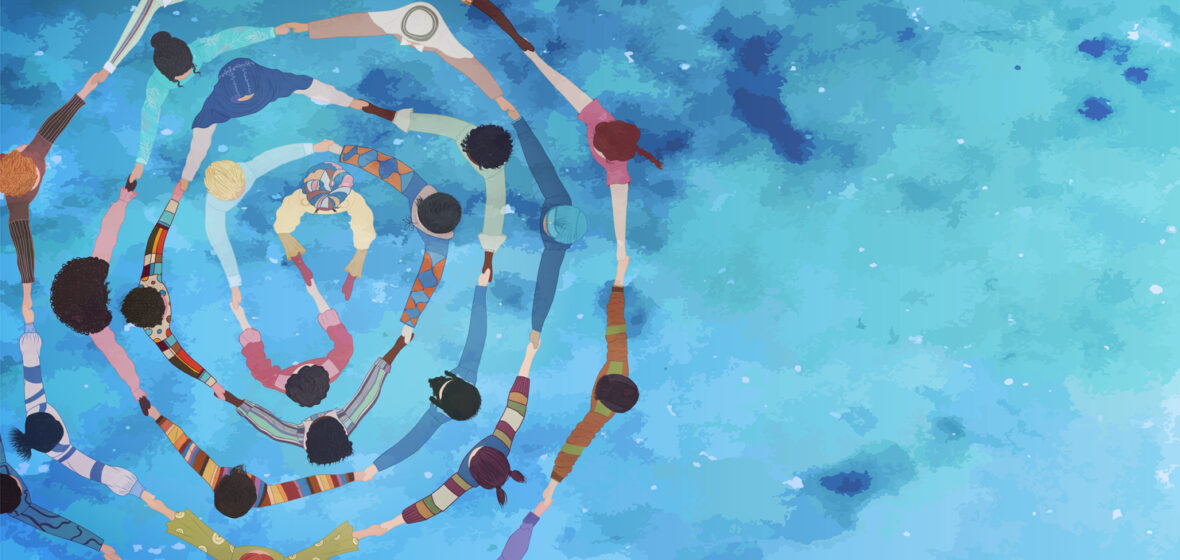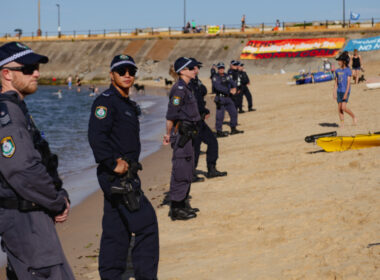End Gender Apartheid began last year as a campaign led by lawyers, politicians, activists and humanitarians in Iran and Afghanistan. The founders acknowledge that gender discrimination, oppression and violence are global realities, but this particular campaign focuses on Iran and Afghanistan where draconian laws that rob women of education, freedom, dignity and agency require urgent international intervention.
As a priority, End Gender Apartheid is seeking to amend the existing definition of apartheid under international law to include gender hierarchies, rather than only racial hierarchies. By doing so, there will be an enhanced range of political and legal tools available to enable international action against systems of gender apartheid.
On October 5, the Atlantic Council’s Strategic Litigation Project, together with the Global Justice Center, issued a joint letter and legal brief urging the international community to codify the crime of gender apartheid in the UN’s crimes against humanity treaty.
Dozens of jurists, scholars, and civil society representatives were signatories to the letter urging United Nations member states to codify the crime of gender apartheid in the Draft Crimes against Humanity Convention. The (arguably) outdated 1998 Rome Statute of the International Criminal Court (ICC) is being reinforced by the Crimes against Humanity Convention, the first major global treaty on international crimes in nearly 30 years.
“We need to revisit the definition of crime of apartheid, enforced disappearance, enforced pregnancy under the Rome Statute 1998. We think this specific treaty will reinforce international law and put the obligation on states to ratify this treaty into domestic laws, so that they have a positive duty to prosecute, or extradite individuals committing crimes against humanity,” Human rights lawyer Azadah Raz Mohammad tells LSJ.
Member States had an opportunity to express support for codifying the crime of gender apartheid through oral statements during the October 2023 and April 2024 sessions of the UN Sixth Committee (Legal), and through written comments and observations until the end of 2023. In September last year, UN Women’s Executive Director Sima Bahous called on the international community to explicitly codify gender apartheid under international law.
Amongst the signatories to the letter were Nobel Peace Prize Laureates Nadia Murad, Shirin Ebadi, Malala Yousafzai and Narges Mohammadi, the writer and feminist Gloria Steinem, and many lawyers, judges, human rights defenders, and former political figures (not least, Hillary Rodham Clinton).
In a letter to the representatives of member states of the United Nations, the members of End Gender Apartheid wrote:
“The failure to codify gender apartheid perpetuates an accountability vacuum that leaves many victims and survivors without remedy or reparation. The crime of gender apartheid is unique in animus and intent. It is distinct from other international crimes, including gender persecution, due to its dystopian ambition to maintain an institutionalized regime of systematic oppression and domination, where the under‑class is subjugated for the dominant group’s benefit and survival, dehumanized, and cut off from the resources and access needed to overcome their choreographed oppression.”
The letter concluded, “Codifying gender apartheid in the draft treaty does not require the creation of a completely new and separate crime; it only involves inserting gender into the definition of the ‘crime of apartheid.’”
In September 1996, the Taliban took over Kabul and established the Islamic Republic of Afghanistan, implementing a strict interpretation of Qur’anic instruction and jurisprudence. It also provided a haven for al-Qa‘ida to recruit and train fighters. While the US and allies ousted the Taliban and installed troops for two decades from October 2001, as soon as troops withdrew in August 2021, the Taliban regained control and implemented even harsher restrictions on the populace, and women specifically.
Gender apartheid is seen in the Taliban banning women and girls from education and almost all employment, traveling long distances without a male guardian, adhering to a severe dress code with arrest and torture if they do not. Women are also banned from all public spaces. Women who have protested have been threatened, detained, arrested, tortured, and forcibly disappeared. The humanitarian and economic crises have led to displacement, poverty, and food insecurity with an estimated 23.7 million Afghans dependent upon humanitarian aid in February this year.
Gender apartheid in Iran is seen in the Islamic Republic denying a woman the right to divorce her husband or to gain custody of her children, banning women from obtaining a passport and traveling outside the country without the permission of a male guardian, and denying women the right to speak, sing, or move freely in public spaces. They, like women in Afghanistan, are forced to wear compulsory hijab or risk threats, detainment and disappearance.
Practical consequences for leaders and women
End Gender Apartheid claim that “if Gender Apartheid becomes a legally recognisable term, we will have pathways of prosecution for the leaders who are enacting these atrocities. We will also set a new historic precedent that this behaviour is not tolerated by the international community. Apartheid is not only a crime, but it is also subject to universal jurisdiction, imposing an obligation on states to investigate and prosecute alleged perpetrators of apartheid when they are present in the country.”
If the crimes against humanity treaty is adopted and the crime of gender apartheid is included, any country that is party to the treaty would be obligated to criminalise gender apartheid and to prevent and punish crimes against humanity under their domestic laws. Under the principle of universal jurisdiction, this could lead to prosecutions regardless of the perpetrator or victim’s home country, or in the event that acts occurred in a different country.
LSJ spoke to Azadah Raz Mohammad, a Melbourne-based human rights lawyer, a PhD candidate at the University of Melbourne, and a legal advisor for the Strategic Litigation Project at the Atlantic Council.
Azadah was in grade one when she left Afghanistan in 1998, the same year the Taliban closed schools and banned girls aged eight and over from attendance. She says that the current conditions in Afghanistan are like “déjà vu”.
She tells LSJ, “The first time they were in power was 1996 to 2001. My early childhood was under siege, so we bribed tribal elders to help us to leave. We begged the international community during the Doha negotiations [in February 2020], and I naively believed they’d never hand Afghanistan to Taliban a second time.”
“I’ve lost relatives, friends and colleagues. I want to work for a better Afghanistan because if not us, who will?”
Azadah studied law in the UK, was a Fulbright Scholar in the US, and moved to Melbourne in 2020.
She says, “Every day that I wake up, I receive one or two messages asking for help from someone I know in Afghanistan to help them get out, or to send money because they don’t have anything to eat, or they’re in neighbouring countries and don’t know where to go next.”
Azadah’s official tenure as a member of the Atlantic Council started in January 2024, but she has been involved in the End Gender Apartheid campaign since March 2023, along with her colleagues at Atlantic Council.
She says, “The international community has been discussing the draft [Crimes Against Humanity] convention for a long time. Since last year, it took on momentum when the UN member states gathered and said that the international community needs such a treaty. We believe that the next discussion of this treaty will be in October. The international community will decide, ‘should we go ahead with formal negotiations, or does the world not need this convention?’”
The Seventy-ninth session of the UN Sixth Committee (Legal) is now underway and runs until 22 November.
She explains, “If things go well in October, we believe that it will go to formal negotiation at the United Nations General Assembly Sixth Committee. Based on our estimation, which is optimistic, it would take around two years for it to be codified and ready for adoption and ratification.”
“It is crucial that we generate momentum to talk about it … women in both Afghanistan and Iran are suffering immensely. While adopting gender apartheid into international and domestic law is not a quick fix, Mohammad says, “This is an important legal mechanism to intervene and stop Taliban operations. As an example, in South Africa the international community intervened after decades of an apartheid system. Recognising the Taliban as an apartheid system gives us the essential tools to intervene.”
Azadah points to recent reports indicating that over half of Afghanistan’s population are in urgent humanitarian need and on the borderline of starvation. In Jalalabad, 700 children have died of malnutrition since the beginning of this year.
“That’s extremely horrifying,” she says. “We need humanitarian aid, but this humanitarian aid has not been monitored by the international community. We have reports saying that most of the humanitarian aid going to Afghanistan doesn’t actually go to the most vulnerable people.”
In January this year, there were 620,000 registered widows in Afghanistan, which is likely to be a much greater number in reality.
Azadah says, “I was talking with a friend of mine in Kabul. She was saying that most of these widows don’t have any male relatives to go with them outside. Taliban says that woman going outside, even for basic essentials, should be accompanied by a male guardian – a brother, husband or father. But most of these women don’t have anyone, so she cannot go to access the humanitarian aid. Funds for Afghanistan actually support Taliban financially.”
Considering the campaign is relatively new, Azadah is upbeat about the number of states indicating they’re on board.
“Australia has indicated that they will support,” she says. “Austria, Brazil, Chile, Iceland, Malta, Mexico, Philippines, the United States… it’s a good number for a campaign running only year and a half.”
She says that the international community has been slow to act on gender-based violence and that “Afghanistan could be a catalyst for change”.
It was as recent as 2008 that the UN Security Council passed Resolution 1820, which states “rape and other forms of sexual violence can constitute war crimes.”
Gissou Nia is the director of the Strategic Litigation Project, and on the board of the Iran Human Rights Documentation Center.
She tells LSJ, “In the way that we have a Genocide Convention to globally codify and criminalise genocide, and the Geneva Conventions to address war crimes, the Crimes Against Humanity Draft Treaty – once adopted – would mean there’s a global treaty on crimes against humanity. So far, 10 states have expressed support for inclusion of gender apartheid in the treaty.”
She adds the next step towards adoption is if the Draft Treaty moves to negotiations, “which would be discussed on 10 October, with a decision on 22 November.”




